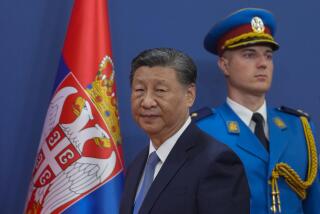China President’s Tour Underscores Shifts in Latin American Landscape
- Share via
HAVANA — China’s President Jiang Zemin relaxed in the Cuban beach resort of Varadero on Saturday, basking in the glow of multimillion-dollar trade deals, warming ties and a meeting of the world’s two most visible Communist leaders.
Two nights earlier, Jiang sang “Guantanamera” and Chinese opera over dinner with an amiable and animated President Fidel Castro. Foreign Minister Tang Jiaxuan signed agreements formalizing $374 million in credits to help Cuba purchase 1 million Chinese television sets, modernize the island’s telecommunications and build a seafront luxury hotel in downtown Havana.
But Jiang’s visit, which ends today when he heads to Venezuela, was merely the fifth leg of a 12-day, six-nation Latin America tour by the Chinese leader that has demonstrated the rapidly changing strategic map in America’s backyard.
On a trip paralleling the crisis that has driven a wedge into U.S.-China relations, Jiang has sought new Chinese markets, friendships and diplomatic alliances among such traditional U.S. allies as Brazil, Chile, Argentina and Uruguay.
The U.S.-based rights group Human Rights Watch asserts that Jiang is also lobbying for support to defeat a resolution censuring China’s religious and political repression at this week’s U.N. Commission on Human Rights meeting in Geneva.
A similar vote will be taken on Cuba’s human rights record, and Havana too has been lobbying nations near and far for support.
Yet the timing and imagery of Jiang’s visit to Cuba--where official billboards bore his portrait and addressed him as the “dear” president--underscored both the impact of U.S. foreign policy on trade and President Bush’s characterization of China not as America’s “strategic partner” but as its “strategic competitor.”
On Friday, for example, dozens of Chinese businessmen showed off their latest appliances and technology at a trade expo that filled the cavernous Salon 1930 of Havana’s state-owned Hotel Nacional--while at the same time, three U.S. members of Congress and top lobbyists from America’s rice industry were squeezed into a basement cigar room.
The American group, which also dined with Castro this past week, was staging a news conference calling on the Bush administration to ease or lift America’s 39-year economic embargo of Cuba--and permit access to its $1-billion market--for the good of American business.
Stumping for Missouri rice growers, Washington apple orchards and Massachusetts cranberry farmers, the American businessmen and legislators--two of them Republicans--had failed in their mission to persuade Castro to accept the stringent conditions of a bill Congress passed in October approving food and medicine sales to Cuba.
Those terms included a continued ban on imports from the island and a prohibition against U.S. banks and other lenders’ providing financing for any Cuban purchases.
Still, Rep. George R. Nethercutt Jr. (R-Wash.), who described himself as a “very strong” Bush supporter, vowed to lobby the White House to ease its embargo of a nation 90 miles off America’s shores that has dollarized much of its economy and privatized much of its agriculture.
“We’re trading with Iran. We’re trading with Vietnam,” added Rep. Jo Ann Emerson (R-Mo.). “I find it inexcusable that Cuba would be singled out from those other countries.”
The lobbyists were blunter.
“The American farmer is in dire straits. We need help,” said one representative of the rice growers. “We hear the administration is pro-trade . . . and here we have a country that is willing to help us move our product, and we have seen no movement at all [from the White House].”
Later, when the news conference had ended and the American delegation was preparing to leave for the airport aboard a rented bus, the members of the Chinese delegation were already speeding out of the hotel driveway. Their transportation: eight late-model Mercedes-Benzes from the Cuban government fleet.
More to Read
Sign up for Essential California
The most important California stories and recommendations in your inbox every morning.
You may occasionally receive promotional content from the Los Angeles Times.













